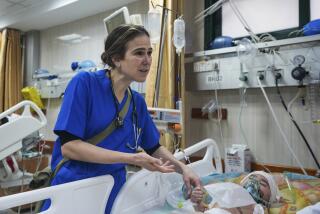Any healthcare in Iraq is a miracle
- Share via
Re “Decrepit healthcare adds to toll in Iraq,” Nov. 11
Anyone who has been following events in Iraq for the last 16 years knows that the U.S.-coerced U.N. economic sanctions put in place during the first Bush administration, and maintained through President Clinton’s and the second Bush administration, substantially weakened Iraq’s healthcare systems long before the 2003 military invasion. It is the sanctions, plus the U.S.-led invasions, that are the root causes of the situation. The rest, awful in themselves, are in large measure a result of our government’s actions.
However, the sanctions are barely mentioned at the end of one sentence deep in your article. Is there really no explicit connection between Iraq’s crippled healthcare system and our military invasions of the country? I am ashamed to think that the U.S. will try to wash its hands of any guilt for the horrific destruction to Iraq that has been done for the last 16 years.
STEPHEN SIMON
Claremont
*
The U.S. has done a poor job in health reconstruction projects funded by American taxpayers. But I take exception to the dismal scenario painted in your article.
With minimal resources and its morgues overflowing with bodies, the Iraqi health system has managed to care for an onslaught of trauma patients in its hospitals and prevent epidemic disease outbreaks. The great majority of its 150,000 civil service employees report to work daily, regardless of personal danger. I have great respect for Iraqi physicians, who are savvy clinicians unaided by technology.
Saddam Hussein diverted almost all healthcare funding after 1986, when his war with Iran took a turn for the worse. Since that time, health workers have charged patients for everything from starting an intravenous line to administering a medication.
Could we have done better in how we chose to invest our reconstruction dollars? Of course. The former and current ministers of health (both of whom are practicing physicians) pointed out to me that it will take them a generation to overcome 20 years of neglect, regardless of whether we help them.
JON BOWERSOX MD
Cincinnati
The writer was the health attache and director of health sector reconstruction at the U.S. Embassy in Baghdad from 2005-06.
*
That there is a medical system in Iraq at all is amazing. How can a nation that has been invaded, had its infrastructure reduced to rubble, whose professional class has been removed and ostracized and is still living daily with savage violence and unprecedented turmoil, have any medical care? It is a testament to the courage of these Iraqis that they are able to do anything at all.
Perhaps the real story should focus on the virtually total dysfunction within our own medical system. The problems at Martin Luther King Jr./Drew Medical Center here are just the tip of the iceberg.
WILLIAM BRADY
Reseda
More to Read
Sign up for Essential California
The most important California stories and recommendations in your inbox every morning.
You may occasionally receive promotional content from the Los Angeles Times.













